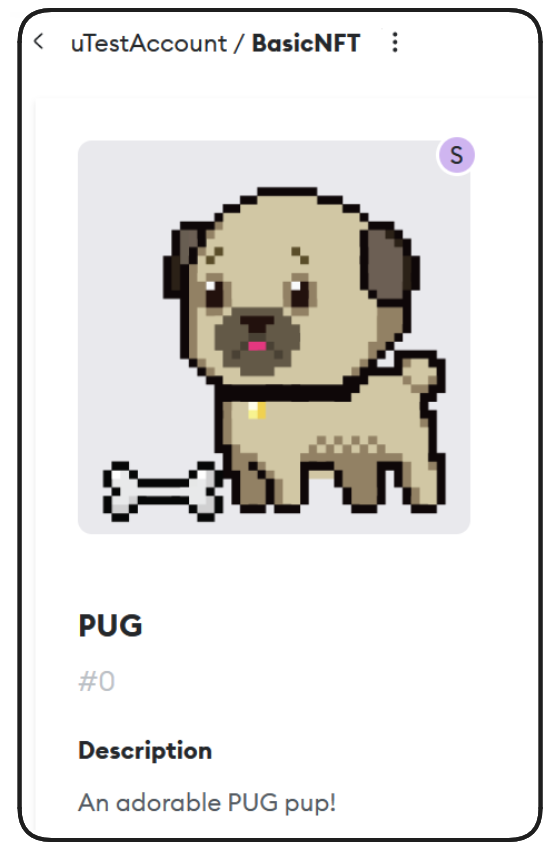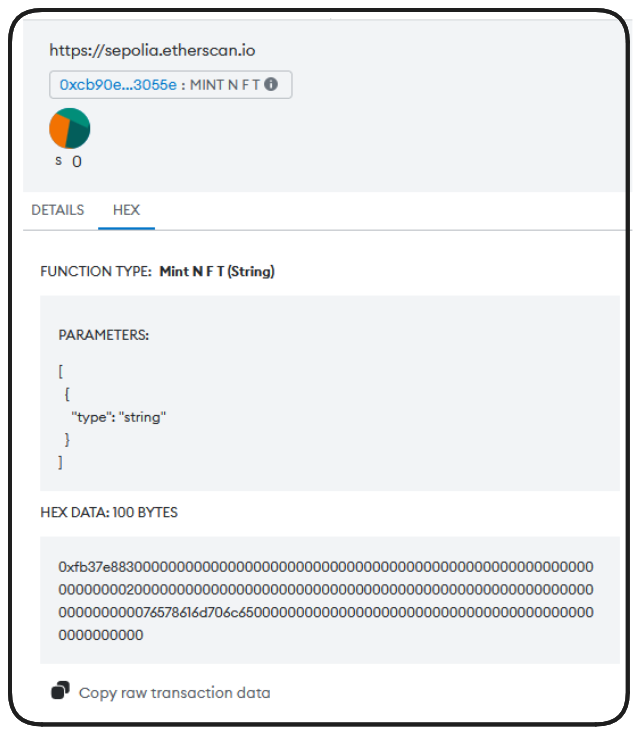5/5
_Follow along with this video._ --- ### Recap Guess what. You just learnt an insane amount in this section. Let's run down the things we covered. We started off by learning what a `Non-fungible token (NFT)` is. And we explored this technology by creating our very own `BasicNFT`.  While going through this process, we learnt all about options for decentralized data storage including services like - [**IPFS**](https://ipfs.tech/) - [**Pinata**](https://www.pinata.cloud/) - [**NFT Storage**](https://nft.storage/) - [**Web3 Storage**](https://web3.storage/) We also learnt that we could store data and image directly on the blockchain by creating a dynamic, on-chain `SVG NFT` that we can use to reflect our mood!  While we're able to store this data on chain, it's important to note that it may become prohibitively expensive from the perspective of gas and computation. We proposed protocols such as [**Filecoin**](https://filecoin.io/) and [**Arweave**](https://arweave.org/) which serve to mitigate these concerns in decentralized data storage. Beyond `NFTs` we learnt a great deal about encoding! We used `base64` encoding to encode our `tokenURI` data to store on-chain. We explored how a compiled contract is broken into not just an ABI, but a bytecode component and that it's this encoded, binary, bytecode that is read and understood by the EVM. In addition to this we learnt how to encode our transaction data into this bytecode and how we can make low-level calls using this encoded data. We learnt the power of `abi.encode/abi.decode/abi.encodePacked` and how these globally available methods can allow us fine control over our interactions with the `EVM` and our transactions. As a result of our greater understanding of how encoded data is used in EVM transactions, we also gained the ability to verify any transaction sent to our wallet and to keep ourselves safe from malicious ones.  ### Wrap Up Now's a great time to take a break. You've made it through another massive section and just by getting this far you've gained skills that only a small selection of Solidity devs have. You're growing very quickly. We've only got a few more sections that remain: - DeFi - Upgradeable Contracts - Introduction to Security The next lesson in particular is going to really put you to the test. So, take your break, and I'll see you when you get back! 🎊🎊🎊🎊🎊🎊🎊🎊🎊🎊🎊🎊🎊🎊🎊🎊🎊🎊🎊🎊🎊 NFT Challenge [**Sepolia**](https://sepolia.etherscan.io/address/0x93c7A945af9c453a8c932bf47683B5eB8C2F8792#code)
Follow along with this video.
Recap
Guess what. You just learnt an insane amount in this section. Let's run down the things we covered.
We started off by learning what a Non-fungible token (NFT) is. And we explored this technology by creating our very own BasicNFT.

While going through this process, we learnt all about options for decentralized data storage including services like
We also learnt that we could store data and image directly on the blockchain by creating a dynamic, on-chain SVG NFT that we can use to reflect our mood!

While we're able to store this data on chain, it's important to note that it may become prohibitively expensive from the perspective of gas and computation. We proposed protocols such as Filecoin and Arweave which serve to mitigate these concerns in decentralized data storage.
Beyond NFTs we learnt a great deal about encoding!
We used base64 encoding to encode our tokenURI data to store on-chain.
We explored how a compiled contract is broken into not just an ABI, but a bytecode component and that it's this encoded, binary, bytecode that is read and understood by the EVM.
In addition to this we learnt how to encode our transaction data into this bytecode and how we can make low-level calls using this encoded data. We learnt the power of abi.encode/abi.decode/abi.encodePacked and how these globally available methods can allow us fine control over our interactions with the EVM and our transactions.
As a result of our greater understanding of how encoded data is used in EVM transactions, we also gained the ability to verify any transaction sent to our wallet and to keep ourselves safe from malicious ones.

Wrap Up
Now's a great time to take a break. You've made it through another massive section and just by getting this far you've gained skills that only a small selection of Solidity devs have.
You're growing very quickly.
We've only got a few more sections that remain:
DeFi
Upgradeable Contracts
Introduction to Security
The next lesson in particular is going to really put you to the test. So, take your break, and I'll see you when you get back!
🎊🎊🎊🎊🎊🎊🎊🎊🎊🎊🎊🎊🎊🎊🎊🎊🎊🎊🎊🎊🎊
NFT Challenge
Section Recap
A foundational guide to Setting Up Your Foundry Project for ERC-721 NFTs - Initialize a new Foundry project, integrate OpenZeppelin's ERC-721 contract implementation, and understand the crucial role of token IDs and metadata URIs in NFT creation.
Previous lesson
Previous
Next lesson
Next
Course Overview
About the course
What you'll learn
Advanced smart contract development
How to develop a stablecoin
How to develop a DeFi protocol
How to develop a DAO
Advanced smart contracts testing
Fuzz testing
Manual verification
Course Description
Who is this course for?
- Engineers
- Smart Contract Security researchers
Potential Careers
Web3 Developer Relations
$85,000 - $125,000 (avg. salary)
Web3 developer
$60,000 - $150,000 (avg. salary)
Smart Contract Engineer
$100,000 - $150,000 (avg. salary)
Smart Contract Auditor
$100,000 - $200,000 (avg. salary)
Security researcher
$49,999 - $120,000 (avg. salary)
Meet your instructors
Web3 engineer, educator, and Cyfrin co-founder. Patrick's smart contract development and security courses have helped hundreds of thousands of engineers kickstarting their careers into web3.
Guest lecturers:
Last updated on February 17, 2026
Duration: 37min
Duration: 3h 06min
Duration: 5h 03min
Duration: 6h 22min
Duration: 2h 48min
Duration: 1h 24min
Duration: 4h 28min
Duration: 1h 20min
Duration: 1h 11min
Course Overview
About the course
What you'll learn
Advanced smart contract development
How to develop a stablecoin
How to develop a DeFi protocol
How to develop a DAO
Advanced smart contracts testing
Fuzz testing
Manual verification
Course Description
Who is this course for?
- Engineers
- Smart Contract Security researchers
Potential Careers
Web3 Developer Relations
$85,000 - $125,000 (avg. salary)
Web3 developer
$60,000 - $150,000 (avg. salary)
Smart Contract Engineer
$100,000 - $150,000 (avg. salary)
Smart Contract Auditor
$100,000 - $200,000 (avg. salary)
Security researcher
$49,999 - $120,000 (avg. salary)
Meet your instructors
Web3 engineer, educator, and Cyfrin co-founder. Patrick's smart contract development and security courses have helped hundreds of thousands of engineers kickstarting their careers into web3.
Guest lecturers:
Last updated on February 17, 2026







